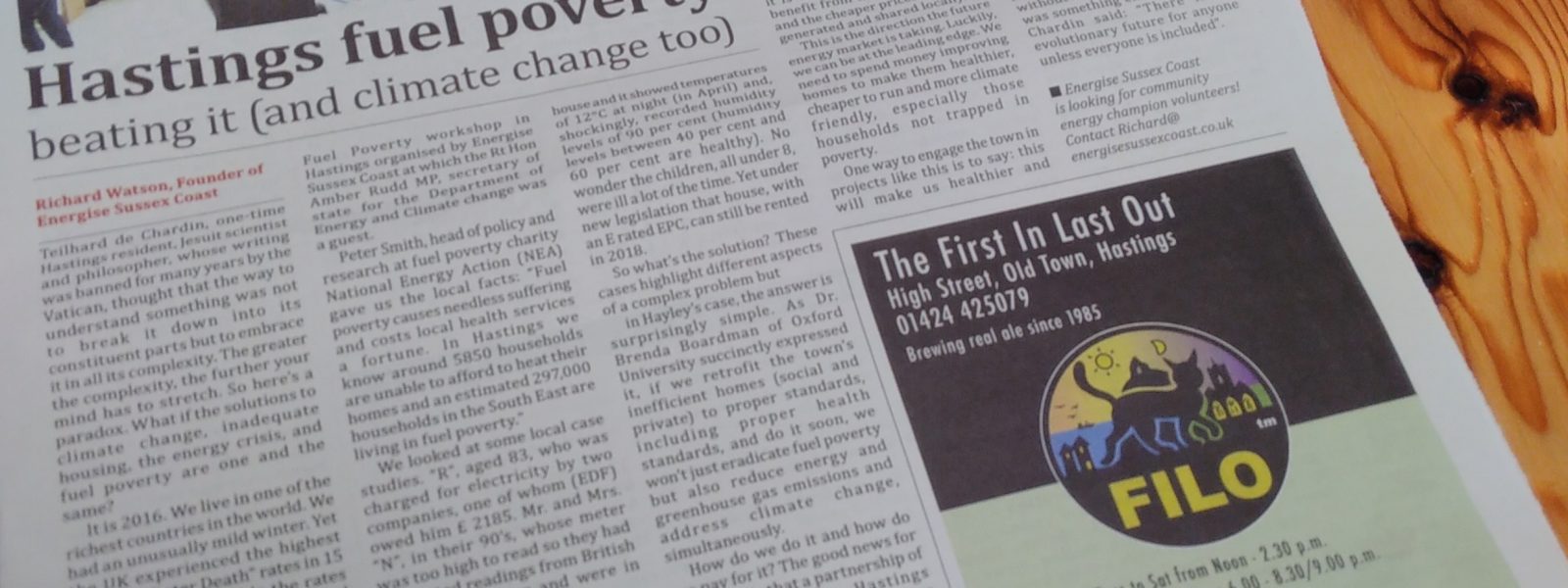Teilhard de Chardin, one time Hastings resident, Jesuit scientist and philosopher, the one whose writing was banned for many years by the Vatican, thought that the way to understand something was not to break it down into its constituent parts but to embrace it in all its complexity.
The greater the complexity, the further your mind has to stretch. So here’s a paradox. What if the solution to climate change, inadequate housing, the energy crisis, and fuel poverty were one and the same? It is 2016. We live in one of the richest countries in the world. It was an unusually mild winter.
Yet the UK experienced the highest Excess Winter Death rates in 15 years (43,900). Double the rates in Scandinavian countries that are far colder. 9000 people died because their houses were too cold. You can imagine the “National Scandal” headline except that such a headline never appeared. Where are our media?
According to Dr Mari Martiskainen, a Research Fellow at the Centre on Innovation and Energy Demand based at the Science Policy Research Unit (SPRU) at Sussex University. “2.35 million Households in England living in poor quality, energy inefficient housing have to decide each winter whether to ‘eat or heat’.” Mari was a speaker at last Friday’s Community Solutions to Fuel Poverty workshop in Hastings organised by Energise Sussex Coast where the Rt Hon Amber Rudd MP, Secretary of State for Energy and Climate Change was a guest.
Peter Smith, Head of Policy and Research at fuel poverty charity National Energy Action (NEA) gave us the local facts: “Fuel poverty causes needless suffering and costs local health services a fortune. In Hastings we know around 5850 households are unable to afford to heat their homes and an estimated 297,000 households in the South East are living in fuel poverty.”
We looked at some local case studies. “R”, aged 83, who was charged for electricity by two companies, one of whom (EDF) owed him £ 2185. Mr. and Mrs. “N”, in their 90’s, whose meter was too high to read so they had estimated readings from British Gas for 1.5 years and were in credit by £ 1100.
You may have seen one of our case studies featured in the BBC Panorama programme “Too poor to stay warm” and in the BBC article “Anatomy of a cold home” featuring Hayley and her three children from Hollington.
Their rented property has prepayment meters, a boiler last made in 1995, old style radiators, and dangerous condensation everywhere. They have to wipe black and white mould off their belongings almost daily. We put a datalogger in the house and it showed temperatures of 12 at night (in April) and, shockingly, recorded humidity levels of 90% (humidity levels between 40 and 60% are healthy). No wonder the children, all under 8, were ill a lot of the time. Yet under new legislation that house, with an E rated EPC, can still be rented in 2018.
So what’s the solution? These cases highlight different aspects of a complex problem but in Hayley’s case, the answer is surprisingly simple. It was succinctly and passionately expressed by Dr Brenda Boardman of Oxford University at the workshop last week.
If we retrofit the town’s inefficient homes (social and private) to proper standards, including proper health standards, and do it soon, we won’t just eradicate fuel poverty but reduce energy and greenhouse gas emissions and address climate change, all at the same time.
How do we do it and how do we pay for it? The good news for Hastings is that a partnership of Amicus Horizon, Hastings council and Energise Sussex Coast have won £ 900, 000 in an EU funded bid to improve 600 homes in Ore over 3 years – the first Climate Active Neighbourhood (CAN) scheme. Part of the scheme involves installing smart meters and home energy management systems in 100 homes so that households can make the most of solar energy even when there are no panels on their roofs. A “club” of residents are then helped to switch their energy demand away from peak times, to store energy when it is cheap and reduce their use when it is expensive who can then benefit from time of use tariffs and the cheaper prices of energy generated and shared locally.
This is the direction the future energy market is taking. Luckily, we can be at the leading edge of it. The challenge is going to be engaging people enough so that they will want to change their behavior and spend money improving their homes to make them healthier, cheaper to run and more climate friendly, especially those households not trapped in poverty. So let’s figure out what makes us happier – and that could include lifting our community out of fuel poverty – and everything else may follow. More money, local jobs, local energy, more community spirit.
We love our town, care about it, invest more locally, buy less stuff we don’t need, grow our own food, make our homes cosier. All of which reduces carbon without us even noticing it. That was something else Teilhard de Chardin said. There is no evolutionary future for anyone unless everyone is included.
Energise Sussex Coast is looking for community energy champion volunteers! Contact Richard@energisesussexcoast.co.uk
